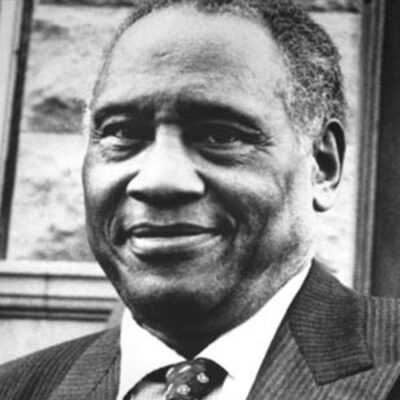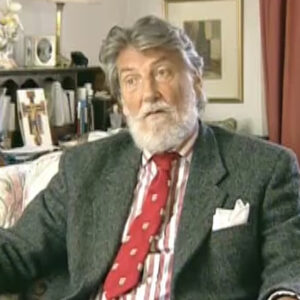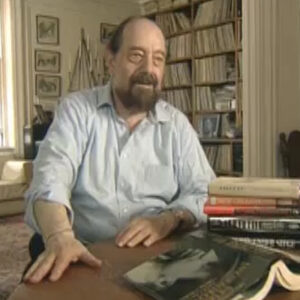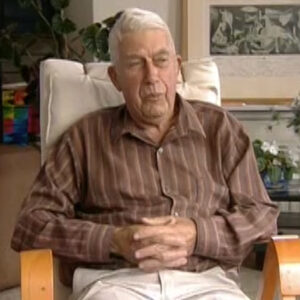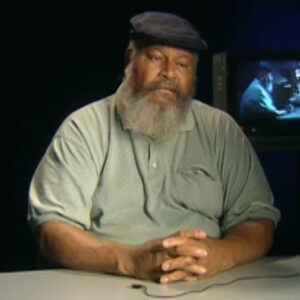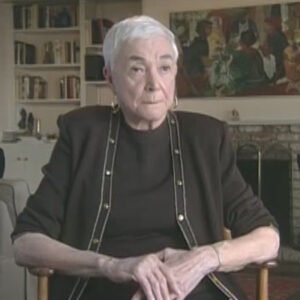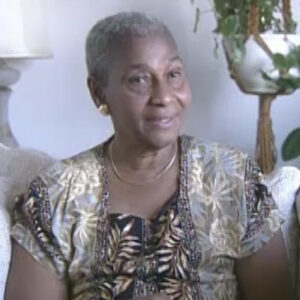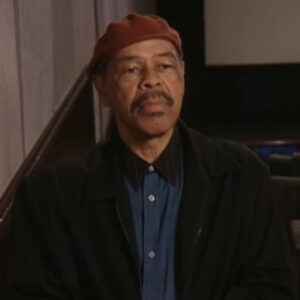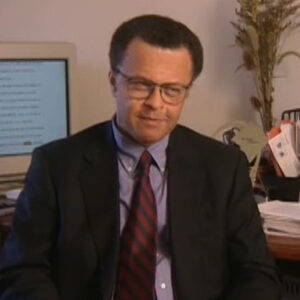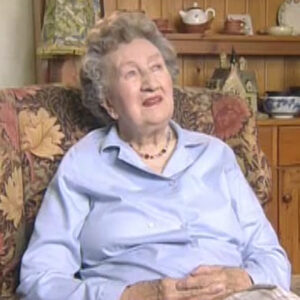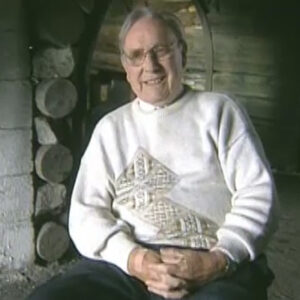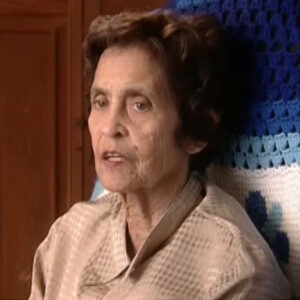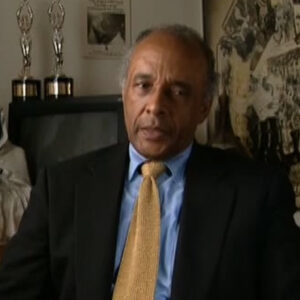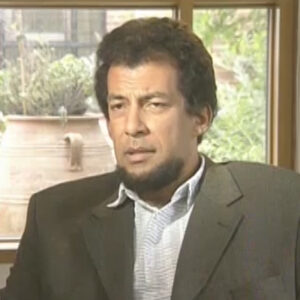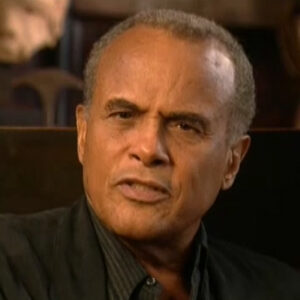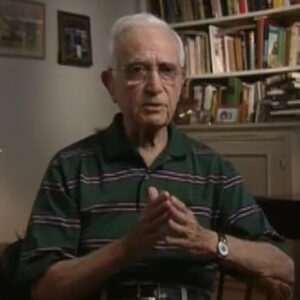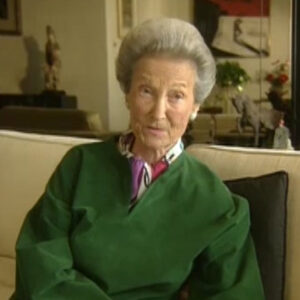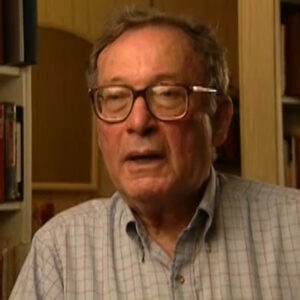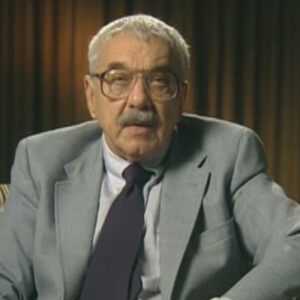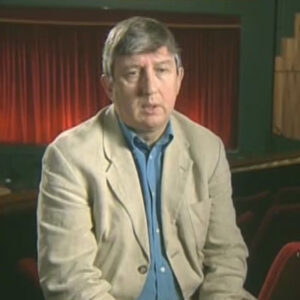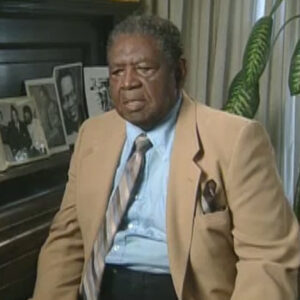Speaker Well, my original basis was in the east end of London in Stepney, and that was an area where we had the most wonderful activities, always involved with it. It was taken the landlords on or whether it was during the time of the rise of fascism and Hitler. We were always involved. And we were we were the sort of youngsters who set up our own tents and went off and discussed.
Speaker And on this background, we had because of the background, we had a really high cultural activity.
Speaker Were you aware your parents want an activist to know they weren’t activists, but no, no, in this area of Stepney there were no such thing as parents who were then so called Tory, you say we’re all sympathetic. Life was a very hard struggle. In that time, our houses were missing and the schools were worse. I mean, it had on this we had to build a full life so that you are so high up in that way.
Speaker So how so?
Speaker How did you get from that to, you know, being a leftist, a socialist, a communist, or at least that it was at the time when a very high percentage of people, particularly in an area like Stepney, were very involved.
Speaker And really what started me, I think, was the question of the Spanish Civil War. It seemed so dreadful that a country should be destroyed in this way that we or we just sort of automatically wanted to protect it.
Speaker And so the first thing I was doing was going around the streets collecting for medical aid for Spain.
Speaker Did you did you meet your husband during that time or afterwards?
Speaker Actually, he’d been married before and his wife was working in the same building as I was, and so he’d come to collect her for lunch or something and a. I had already discussed with her the position of a possibly a war breaking out and what we would do about that building for defense, against bombing and so forth. So I really had a discussion with Connie. And so when Papu came, this was typical of Pappert. You didn’t have all that money, but automatically he said, come out and have lunch with us. I never because I’m always very careful with people with that much money. But but as a result, now, she died after the war when I was on holiday in Czechoslovakia and Pat was there on health grounds. And when we came back, we just associate. But you see, we had something in common a long time.
Speaker So now he was he was well respected trade union.
Speaker He was a in a special category. There’s a history of told of the Transport Workers Union or the history of working class over there. And the historian said in many ways he was a greater man than Ernest Bevin.
Speaker So he had that sort of standing. And another book says that when Underspecified went to the peace conference in Germany, what’s the name of the place?
Speaker And you could see that people felt when they looked at Maisky that Pappe was looking over his shoulder. It showed that he had a very special understanding. Then he was the only communist on the general counsel of the U.S. up to that time, that only after that, I think they’d only been one painter of the miners. And they got him off, got onto the general counsel of the T u c assembly member. He wasn’t a full time organizer.
Speaker He was still a conductor on buses and having served and come to establish unions in Greece and India and other places of the transport in 49, there was a terrific campaign, particularly led from America. We want you to get rid of communists. And so the Transport and General Workers Union took a vote that no communists would be allowed to hold office now of quite a number of them, then left the Communist Party in order to to leave. But he didn’t. He he said he would remain a member of the Communist Party. And so he had this special respect. Um.
Speaker In the whole trade union movement, not just by the left, is because of the 100th anniversary of the T u c water citrine, who’d been general counsel, his secretary of the to see a very well known general secretary said to me, I had nothing but respect for Papi.
Speaker You are where you are. Did you work side by side with him and were you a communist?
Speaker Also, I was a communist. Yes, but I’ve always been involved in other work. I’ve been involved in peace activities and so forth. I like to I don’t like to be on top of things. I like to set up my own way of workings so that today I am responsible for our peace talks and Hamsterdam. I’d like to discuss with people and to listen to people.
Speaker I it’s very difficult to say when one hears first or somebody because we don’t have the media, we didn’t have the media before the Second World War, which we have now. So that is some sort of background that we got to know people with a limited media. But we were interested in entertainment and this wonderful force that was coming over on Showboat. And as I explained to you, there was the Spanish Civil War and the fact that Paul Robeson was involved made him especially dear to us. OK, but when the question is, when did you first and foremost, I think it must have been about nineteen thirty seven.
Speaker And as what both in the role of a singer, actor and also as a person who cared for people in as much as he went to Spain, did you did you ever see him in Showboat?
Speaker Did you ever go to any of his plays before the war?
Speaker I never went to his place. We were we never had the money, really tried to do that sort of thing.
Speaker OK, did you hear did you hear him on the radio?
Speaker Oh, yes. We knew his voice. We all had his records. And it was then that we heard about the Savoy Hotel that they weren’t permitting him.
Speaker If you could, you could tell me about the Savoy Hotel and what do you know that happened?
Speaker He had been I think he had been invited to the Savoy Hotel. And when he arrived, they said he was not acceptable because he was black. And he had to leave, what was the reaction? Well, it did hit all the newspapers because she was already accepted as one of our great entertainers.
Speaker And I think that the general public reacted in a very sympathetic way to Paul.
Speaker Did you actually see and meet him during, uh, during the Spanish Civil War campaign and talk to him?
Speaker No, I didn’t talk to him during the Spanish Civil War campaign, but I might have heard him speak. I couldn’t say specifically.
Speaker So when was the first time you actually saw him in person?
Speaker Well, it was after the Second World War. They said he had spoken at Lincoln’s Infeld to a gathering of about 100000 and he had sung his songs. And one particular song sort of struck me even at that time that he sang. Do you call that a brotha?
Speaker And it’s stuck in my mind, and as you know that. Had relevance to what happened to him. Do you call to call that a brotha? I don’t know if you know the song, we do pick it up and you’ll see it.
Speaker What was the what was your what? Just generally, what did people think of them?
Speaker I mean, the people with whom I was involved felt that he was.
Speaker A very great man in every way, a great entertainer, a great man for peace and internationalism, and the fact that he was black perhaps endeared him even more to us because we realized he had an additional obstacles to overcome.
Speaker OK, now, did you ever meet his wife?
Speaker Oh, yes, I no. I also drove his wife. Oh, I know. When did you meet his wife? It was it. I’m trying to remember the time I met. Well, after the Second World War, and it would have been something before the 1960s, we had accused lawyer uprate and this lawyer was responsible for all the legal activities to get Rosen out of it, to get a passport returned.
Speaker Yeah. And you both us at that gathering. And then I took her home and she discussed with me the question of the final. Area where Rob was trying to get out, get his passport so that he could travel, and at that time it was said that they could get him out through Canada. And he said, I won’t move until Pritt. This lawyer tells me to that I can.
Speaker What was your impression of her?
Speaker Of course, she she was a. A very attractive, smart lady and.
Speaker I have I was sort of impressed the way she dealt with this question and without with with a certain optimism that she had to go through this with poor and suffered with poor, and yet she was able to speak of it in a logical way of trying to do that. We had to find a way round. And she didn’t seem to be the lady who would throw the sponge in.
Speaker I don’t know if you’re, like, such a nice guy. That’s why I say now. Uh.
Speaker You know, that they had do you know that marriage? Yes. Why do you I mean, from what you from what you know about him, what you know about her? Do you have any ideas about why they might him?
Speaker Well, unless you’re involved with people you don’t really know, I you know quite well, but to the media played up the fact that Mountbatten’s wife was chasing Paul and did you know about it and that, in fact, the royal family got her out of the country while she was doing Showboat because they thought it was a dangerous situation. So that his attractiveness was obviously there.
Speaker I just make that point, but really I can’t comment on that sort of area that I think it’s what is most important was that these two were able to overcome all these obstacles in addition to the difficulties and stay together to the end. I think that is a great comment on what happens to other people in these circumstances.
Speaker You know, it is I think you’re right is that they you saw him and got to know him when you drove around after he came back after the party.
Speaker Yeah, I really was closely involved with him at the time of the miners festival, and I think it was about fifty six.
Speaker We were staying at the same hotel that there was Paul, Wally Haddington and Pepe and myself staying there. And so the morning of the march, the miners march in Edinburgh, we marched in the front row with Paul Ropes and all Atama came to a standstill.
Speaker What was the issue?
Speaker Well, it’s an annual event among miners to put on the tribute to the whole mining industry and the miners involved. And he they that they the march finishes in Hollywood Park. And he was there to sing and entertain.
Speaker And I always remember that when he left the platform, Alex Moffatt, there were two brothers, Abe and Alex, a APRA’s secretary, I think. And Alex was also a official. And Alex took Paul. And as he walked through, all the children would tap in Paul just to feel him. And I felt particularly touched that he who had been through this dreadful time to have this special warmth of all the children who just wanted to touch him.
Speaker Yeah, so that then, of course, there was another thing, but one when we were driving along, he said that he’d been very touched, that his grandson had written to him and in the letter said, I, too, wish to be known as Paul.
Speaker Mm hmm.
Speaker So did he talk about he talked about what happened to him, that when he sang that the in whole the FBI surrounded the hall and all those who were there were told that they were on the line. If they ever went to a concert that with poor or anything, they would be on the line.
Speaker He when he got back to New York, his brother said to him, you know, you have a brother, please come and sort of participate in our church so that you, as you know, he was had a special attachment to his family and this sort of special thing, whatever. We’re in line with you, ma’am.
Speaker Did he talk about his car, you know, a participation in the coffee era and his his examination before the committee and talk to you about that?
Speaker No, he didn’t. He talked about the reactions to it, such as the when he was the FBI surrounding. Places where he would sing and. They seem depressed or no, he didn’t seem depressed. I think that he was so. Impressed by the warmth of the Scottish miners and the people there that it would if he if he was just over joined by being with people who were there. Another thing that happened was set up in the hotel. He must have been practicing a particular song. And there was a student, music student who was there and who’d been there, who’d been playing the piano at the time at a Hollywood park. And she said she hadn’t a piece of music. Could she copy it? And he immediately said, of course, take it. And she came up to us and said, never had she seen a man so generous with his music as he was just the note. That sort of approach must have had a great impression on young people who, as you know, when they need something, find to have the generosity their. Is something that makes Zekeria life worthwhile.
Speaker Why do you think?
Speaker Well, why do you think he had these depressions and then ultimately a breakdown?
Speaker Well, that question is it’s obvious.
Speaker I think the fact anybody who lives 10 years and the way he did and perhaps it might have been even worse for him than Mandela because Mandela was surrounded by friends in that prison. Whereas he was surrounded all the time by people who wanted to destroy him and what is also important was here was a person who wasn’t able to use his voice. So I think that if you ask why was she depressed, I think that these things must have been very depressing and to overcome them itself was a of miracle associated with Mantello. But I think he had more. Pressure in some ways that Mandela. Hmm, interesting, the whole of the country seemed to be aimed or the media seem to be aimed at destroying this one man.
Speaker So when you ask how did the Depression happen there at the musicians union here, accept responsibility for him when he was here and the assistant general secretary? Oh, Harry Francis was responsible for him. Harry Francis and my husband were very close parties. So we that’s how children were especially involved because of Harry Francis has been a special party. And Harry said that when he when he met Paul off the plane, when he was gone back to America for the last time. Paul was so touched at that time when a little kid came up to him and said, Can I have your autograph? You said that that touched him more than anything. That little kid came up to him. Yeah. So that he although he was depressed, he had his moments of reaction. But I’m not really an authority on this question of depression. But Harry Francis did know about it. And according to Harry that it was particularly the German doctors who said that he would be better in his family background than being in Europe and he should go back to America and be with his family.
Speaker Have you have you heard of any rumors about, you know, government interference in Robson’s health or the CIA, FBI, you know, doping medicine or anything? We’ve heard rumors.
Speaker Have you heard anything about the, uh, the question of the rumors never reacted on our media, so we wouldn’t hear about it, perhaps in the way that you would at however, you know, there was an extremely wide section who was campaigning against this position of Paul Robeson. In fact, I think the whole of the entertainment world and this country were. There to he came to a dinner when he came back, I think it was a piece dinner, and there was an actress who was with him in show boat and she said how her grandchildren felt so close to Paul. And she also told the story that when Paul first appeared in Show Boat, the the cast were already rehearsing. And he.
Speaker Right after rehearsals, it started and as he sang the song Ol Man River, she said this hardened lot of professionals were in tears. Where was this? And this was at the rehearsal of Showboat. This was in, I think, a Criterion restaurant where we had a dinner, a peace gathering, all sorts of theatrical people with a Chipotle and so forth. Um, I think that that’s an interesting story.
Speaker There might not be one of us. Yeah. Yeah. Uh, we know you drove him around, right?
Speaker Oh, I didn’t have to drive him around a lot. But when he you know, he came home here, he came home for dinner because I had just seen a which I think the BBC has now taken one of the Edinburgh Miners Festival. And so, uh, about. Fifteen of us came together at my home and I’d made dinner and Paul came and.
Speaker He.
Speaker I ate and drank a bottle of whiskey. He was a big man, he could drink, he could eat big man. And then afterwards, when we all sat round black hair and everybody was singing, he insisted that everybody sings and whatever they sang, he knew the history of that song.
Speaker And so he sang with us and you can imagine it was a great evening and then at nine o’clock at night, he said that he would have to go to the pickle because Sammy Davis Junior had been attacked by fascists the night before because she was marrying a white woman and about 50 fascists were outside the Pigalle. And he had phoned Sammy Davis and said, I will be with you. And so I drove him to the vehicle. I could have gone in with him, but I had people at home. But I had thought that that really struck a note of a big man. And he’d been through so much at that. His immediate reaction was, I will be with you. And he said that I drove him there and then it was following a funeral, he sang at a. The general secretary of the Harry, it had died and he sang at his funeral, and when he came out and people were ready to drive him, he said, I prefer to have Betty driving me. So that’s how it was. I drove him to the place at the palace home and we just chatted with.
Speaker Was was he there when no, she wasn’t there at that time.
Speaker Mm hmm. OK, that she wasn’t trying to deny that she wasn’t. Well, I think at the time. But not met her afterwards. Uh, yeah.
Speaker Um.
Speaker He seems to have contributed a lot. To those, you know, to the left, to the activist circles, I mean, not only money, but his spirit. I mean, what do you think that people assumed he would do that or did they have to ask them and persuade them? In other words, did he do it freely or did he have to ask them?
Speaker And I don’t think that Paul Robeson had this sort of personality to be persuaded he knew what he wanted.
Speaker Uh.
Speaker What if the persuasion was to be with all the Scottish miners that maybe the Welsh miners, you don’t require persuasion, you are part of it and you feel it’s a privilege to participate with these people?
Speaker At the Scottish mine was a couple of hundred who’d been damaged for life and were there.
Speaker The miners had seen that they were there, though they were crippled as a result of their work down the mines. So the whole thing was had a special humanity about it and warmth. And he was a man of great humanity and warmth. Didn’t require persuasion, he he was just part of it.
Speaker Do you think that one of the reasons that he caught a lot of problems in America was that he refused to back off from his support of Russia?
Speaker Uh, even when things came out about Russia, even other American communist backed up. What do you think about do you think he made a mistake or. I know it’s hindsight now, but, you know, what do you think that maybe he should have saved a lot of trouble?
Speaker Perhaps. But you know that people respect people who stay with their principles.
Speaker And there’s a large section who think more that you stayed with your principles than to suit the occasion.
Speaker You just, uh. Adapted to what the common feeling was at the time, because the whole of this century is the century where people have struggled to lead a decent life and it was very much involved in Russia and he realized it. They of course, they were for all the problems and wars, but it was all involved in the struggle of the common people to lead a decent life. And in many ways, I personally I think that the whole of the life of that Soviet Union led to the strengthening of trade unions throughout the world because the ruling class didn’t want to happen. What happened in Russia said that they were already prepared to negotiate. And the whole sort of standard of negotiating of trade unions improved considerably, possibly as a result.
Speaker Because because he said yes.
Speaker But he he suffered for it, you paid a high price for it, but was paying a high price after all, you have to in there and live with yourself.
Speaker And that that is the process of of, uh, particularly a great man who wants to live with himself.
Speaker Did Paul have any effect on you personally and your politics and in your view, what you do to have an affect on you personally, individually?
Speaker Well, he’s he’s special warmth and as I explained to you, that he that this music student was so impressed by his generosity that I had the impression, be generous, don’t be mean.
Speaker Always on the side of generosity. And that was the impression that. Paul gave me both into wanting to be with Sammy Davis being attacked and this incident of the music being passed over. He was a generous man. He gave his talent freely. It he could have been a very wealthy man. You could have had no problems. But he didn’t want to take that particular process. And he felt very deeply, as you know, about the black people. And you see what’s happening in this country now that the murder of one black boy has started the whole process in this country. We are wanting to do something about the way.
Speaker Right. But you individually, you as a person, did Paul Robeson affect your life?
Speaker Well, it affected my life, and as much as I’ve been so privileged to have been associated and to have known and spoken to him and had prepared food for him and sat around the table with him and discussed these sort of things, like here’s a letter from my grandson, I think that itself, besides, of course, I did go to Stratford to see him playing the special role that he did.
Speaker But he says Hallowes approach to Othello, it’s all sort of made the whole impression. That’s made me a better person.
Speaker I hope. And good luck. And one last thing, maybe that one last thing. Uh.
Speaker What do you think the left here would have been like if Rosen hadn’t come?
Speaker Maybe those questions cannot and that could never be answered. They could never be answered.
Speaker But but what is what is important is when. The history shows that his involvement in this country brought out the best in the country. It developed the whole question of blacks being banned from hotels. The whole question was highlighted, showed that he made that contribution and the country itself, the people in the country.
Speaker Had the quality to be involved.
Speaker And of course, you know, for a time, this is a country that he wanted to live in, he felt more at ease here. In fact, he didn’t live very far from here, you know, just over the Regent’s Park Road within about 100 yards.
Speaker Let me go back. Do you think you want to be here?
Speaker But when he finally went back at the time of the war on.
Speaker Everything, yeah, and whether he said anything about fashion or Swiftwater, uh, when you were driving around and when you met him after his return here, did he talk about how he felt preparing for the Strafford, the.
Speaker Apparently, although he did mention the No.
Speaker It was following a few Rossia that we were talking about the people and.
Speaker I mean, basically, he did talk about the pressure that he was under.
Speaker Yes, they talked about that. Yes, she talked about it. And the fact that his own family could react. One brother saying you should this is you, I’m your brother, this is your church, and that his grandson said to wish to be known as Paul. Those two were very I thought, very significant that he was an international figure, but very close to his family.
Speaker Uh, and you can you can you can you talk a little bit more about the iceberg?
Speaker Uh, I was concerned about his appearance, the Scottish Meiners Festival. What was the hot spot of all trade union activities? People like Michael Fauntroy and others were all invited as special guests to be there. And it was considered a privilege to be there, to be able to participate with the Scottish miners. Scotland has always contributed to the labour movement in a very significant way.
Speaker And the people reacted to him in with warmth, not one, not with. So you’re a great man, but you’re just one of us.
Speaker OK, for us everyone, we are not sorry, OK, could you start again at the question of the passport?
Speaker Of course, I was involved and and I’m trying to remember the one who was leading it is still a friend of mine and it was really so important for us to see the time of Paul coming back and getting his passport back. The passport became a high spot of our activities that so long as America refused Paul Robeson a passport, so long did we feel that America was not overcoming its problems.
Speaker What kind of things did you do?
Speaker We petitioned. We we, uh, went to the American embassy. We pressured and that sort of way.
Speaker What was the what kind of responses to the American embassy give? What did they say?
Speaker Well, at the. You just petitioned, they just wouldn’t say anything.
Speaker America had a special experience in America. I went to I went to the Watts Museum, you know, the watch museum. And my friend who was driving me always did something like this, left his key in the car and close the door. And so we went into the museum and asked the supervisor there if he could get the A A.. And he said, yeah, he doesn’t come over here. We’ll have to find a way of opening your door. And he was a young black man.
Speaker And I said, I know your voice just reminds me of poor Robson’s. And he said, Really? Yes, I should know because I didn’t know Paul Robeson.
Speaker And at that moment, the red carpet was out for me.
Speaker The whole place was he was somebody who knew Paul Robeson. So it isn’t just that.
Speaker That nobody wanted to know about it and. In a period like this, I think it’s significant, the ones who did want to know to whom he was important, it’s significant. It doesn’t come out very much about America, but it must be there that.
Speaker Did Paul ever mention how he was treated in America by black people? Did he ever talk about it?
Speaker No, he didn’t actually talk about it at Papageorge because.
Speaker I didn’t ask the questions, OK? Also, the British Communist Party ever questioned Paul about whether Paul Robeson actually joined the party or not, was that an issue at all? I don’t think they ever questioned him.
Speaker They were basically happy he did what he did.
Speaker They put.
Speaker OK, um, is there anything else you want to say, just some statement, anything that you think?
Speaker Well, I just think that Paul was a big man in every way. Really, I mean, he was a big man, and every age brings up huge big men and he was one of the big men that was blown up, that was built up.
Speaker And the fact that the whole of America seemed to be there to destroy him is a terrible blot on the history of America.
Speaker And that is just kind of rough. What do you think? Do you think that and made any mistakes, tactical mistakes, I’m sure that we all make mistakes.
Speaker It’s only lazy Pakis who do nothing, who make no mistakes.
Speaker All right. I know what I’m asking you. Yeah, I’m sure he made mistakes.
Speaker Can you imagine anybody who would want to be associated with anybody who didn’t make mistakes?
Speaker Right. But what mistakes do you think that were just historically?
Speaker Just I say you have to be involved with the whole of this sort of history to know what mistakes you make. But it’s very difficult to know you haven’t got the whole chessboard. He had it. How can you then assess what the mistakes were in those particular circumstances?
Speaker Historically, that’s what good people are supposed to do, have to look at the past. Yep. Yeah, but this better. Yeah, yeah. Yeah.
Speaker Because they may be more involved in the whole of that chessboard, but you’re not. How can you know when you’re done that. I would know the mistakes he made was important in a man’s life. Is the process what he contributed. If we’re going to drill on the negative side then we are not really appreciating what.
Speaker That’s not true. That’s not true. Oh, that’s that’s just garbage.
Speaker What happens is you have to know the past to look at the future and you can look at it back.
Speaker You can say, OK, I accept that doesn’t exist. I accept what you say. Yeah, I accept what you say. OK, I accept it, OK. So all right, but I want to ask you that question, because you don’t want to I’m I don’t really I don’t really feel.
Speaker Oh. I know it well enough to answer it, OK, as valid, as valid.
Speaker I mean, how do I know about you? I don’t know about you within this given area, therefore.
Speaker Yeah, but you’re one of the few people who drove around with Paul for a while and listen to. Yeah.
Speaker Not that many people can say that, you know. Not that many people can say that.
Speaker Yes. That’s the advantage of growing old. By the way, I don’t like people to call me. I would prefer to be referred to as mature the best whisky’s and mature with the best. Therefore, I want to be known as mature.

